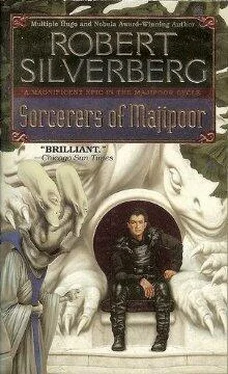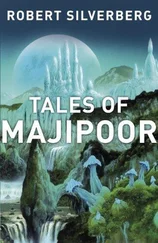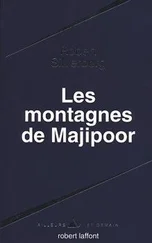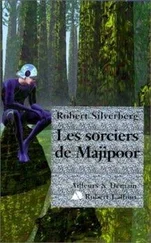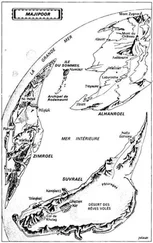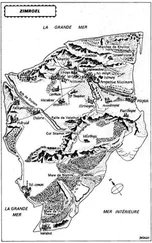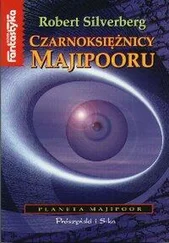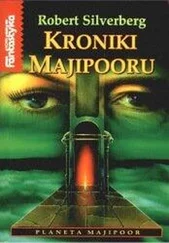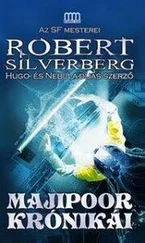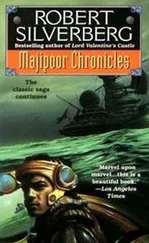“That is an attempt to reconstruct it,” said the Vroon. “I left my half-finished trial model and all my notes behind in the Castle when we so suddenly took our leave of the place. But I have started again on it, and have been working at it all the while we’ve been here.”
“With what purpose in mind?”
“Why, the purpose of reaching out across the Jhelum and making contact with the minds of our enemies as they approach us, and perceiving their strategies and intentions.”
“Ah,” said Prestimion. “What a useful thing! And are you able do it?”
“Not yet,” the Vroon said sadly. “Certain essential parts remain in my room at the Castle with all my other machines both perfected and incomplete, and I have not yet found a way of replicating them here. But I continue to work. It is my great hope, O Prestimion, to present you with this wondrous device before long, as recompense for your saving my life at the Castle.”
“Was Dantirya Sambail who saved your life, not I,” said Prestimion, grinning. “And that only by accident, I think. He was the one forced Korsibar’s hand, and you were freed by the same stroke that sprang me from that dungeon. But no matter: finish your device, and you’ll be well-rewarded for it. We are not so numerous and mighty here that we wouldn’t benefit from being able to read our enemies’ minds.”
He bade Thalnap Zelifor good night, and left him still bent over his coils of golden wire. In his own tent Prestimion sat for a while, thinking about what was to come, and then in time he felt sleep steal over him at last, and dreams as well.
What he dreamed was that he held the planet that was Majipoor in the palm of his hand like an orb, and he looked down at the world in his hand and perceived it to be a vast and intricately embroidered tapestry that was hanging in some dim and shadowy stone hall where a fire flickered. Despite the gloomy darkness of that hall, the details of the tapestry stood out with marvelous darity. By the flickering of the firelight he saw in it all manner of elaborately woven elves and demons and strange beasts and birds moving to and fro in dark forests and thickets of thorny scrub, and here and there a brilliantly blossoming glade. In its weave he made out glints of sunlight and starlight, and bright patches of gold, and the gleam of wondrous jewels, and the differing sheens of human hair and the scales of serpents. And everything was wondrous beyond all understanding, haloed around with an aura of supreme beauty.
The dream remained with him when he woke, holding him in an eerie magical grasp. But then he went to the door of his tent and looked out, and it was gray and raining out there, not at all magical. Not merely raining: pouring. A deluge.
Rains accompanied them all the way back to the Jhelum, day after day. The world seemed to have turned to an ocean of slippery mud. “I would rather cross that accursed Ekesta Pass ten times running than travel through this,” Gialaurys said, cursing; but they traveled onward anyway, through a dreadful realm of soggy dank marshland that had been easy fields on their journey westward the year before. Between one night and the next, winter had arrived in the Jhelum Valley, and winter was a season of never-halting rain in this region, it seemed.
Then they came to the Jhelum itself; and found it in wild spate, high above its old level and far outside its former boundaries, and running with a terrible turbulence where beforetimes it had merely been very swift.
The boats and rafts that they had left for themselves by the shore in the autumn had all been swept away by the flooding. But they were in need of new ones anyway, for they were vastly greater in number now than the army that had come across the river in the other direction; and so they set about once more building boats, and chopping saplings and lashing them into rafts. But would it be possible to cross at all, until after the rains? Already that looked doubtful; and the river grew ever higher every day.
Prestimion called for volunteers to make the crossing and spy out the situation on the far side. A thousand men stepped forward; he picked six, and sent them off on a sturdy little raft, and watched anxiously as they bobbed and tossed on the stormy swollen river. It was so wide now that it was nearly impossible to see all the way to the other shore through the unending rain; but Septach Melayn, posted in a watchtower, stared into the distant dimness and said finally, “Yes, they are across!”
They were gone six days. Then they returned with news that Farholt’s army had reached the Jhelum also and was camped by its edge, thirty miles downriver from them, waiting for the weather to improve.
“How many are there?” Prestimion asked.
“It would have taken all week again to count them.”
“And the mollitors?”
“They have hundreds with them,” said one of the spies. “A thousand, maybe.”
That was ominous news. Mollitors were the deadliest of all beasts-of-war: colossal armor-plated creatures of synthetic origin, first created, like mounts and energy-throwers and airborne vehicles and many other such things, in the ancient times when scientific skills had been greater on Majipoor, and sustained ever since by natural breeding of the old stock. Wide-bodied short-legged things with purple leathery hides hard as iron, they had savage curved claws that could rip a tree apart the way a child might pull leaves from a plant, and massive heads with huge, heavy irresistible jaws designed for rending and crushing. Though they had little intelligence, their strength was so formidable that it was all but impossible to withstand it. And Farholt had brought hundreds of them to the shore of the Jhelum. Thousands, it might be.
Prestimion said to Septach Melayn, “Take four battalions—no, take five, cavalry and foot-soldiers both—and get you down south to the riverbank opposite Farholt’s camp, with plenty of our best mounts. Set up fortifications there, and drill your troops, and make sure you’re seen and heard as you shout your commands. Let there be much clatter every day, and all night long too. Build boats, with all the hammering you can manage. Blow your trumpets; beat your drums, march up and down along the shore. Have your men sing battle-songs, if you can invent some, with all their might. Send spies out by night on the water to stare into Farholt’s encampment. Do everything, in short, that would announce to Farholt that you are on the verge of crossing the river and attacking him. Everything, that is, except actually to attack.”
“Great noise will come from us,” Septach Melayn vowed.
“On the third day, launch your boats toward Farholt by night, preferably in the rain, if it’s still raining, and take no pains to be silent about that either. But turn back after a hundred strokes of the oars. The next night, go out a hundred fifty strokes into the river, and turn back again. Do the same the following night as well. But that night the attack will be no feint.”
“I understand,” said Septach Melayn.
Prestimion, meanwhile, assembled his own assault group, seven battalions of his finest infantrymen and archers, with the remainder of the cavalry force to ride behind them. It took two days to make everything ready; the morning after that he led them seventeen miles upstream, to a place where his reconnaissance men had discovered a large and heavily wooded island in the midst of the river. That would make the crossing easier, having such a place midway to halt. Nor would they be seen there while they regrouped behind the trees, even if Farholt’s scouts were ranging that far up the river. By night, using boats and rafts, he crossed with all his troops over to the island, pausing there to survey and rearrange his force, then proceeding onward about two hours before midnight to the Jhelum’s eastern shore.
Читать дальше
